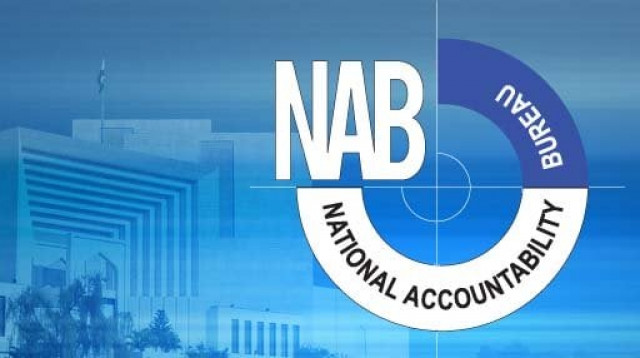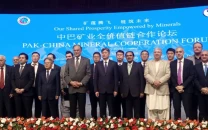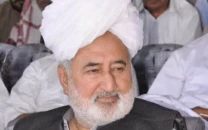Betterment charges’ collection, use to come under NAB radar
HESCO, relevant govt depts lock horns over funding for shifting electricity poles from roads to roadside

The collection of betterment charges from commercial buildings against a range of services and the utilisation of the fee by different departments of the Sindh government will come under probe of the National Accountability Bureau (NAB).
The Sindh High Court’s Hyderabad circuit bench, comprising Justice Nadeem Akhtar and justice Arshad Hussain Khan, ordered the NAB on Wednesday to identify officials who personally benefited from the fee, in an anti-encroachment case. The hearing’s order was issued on Friday.
The court had ordered on January 28 that an across-the-board anti-encroachment operation should be carried out in the district.
The counsel for the Association of Builders and Developers (ABAD) informed the court that the Sindh Building Control Authority (SBCA) had collected over Rs870 million from under-construction commercial buildings in Hyderabad during the last five or six years. He argued that the collected sum was seldom spent on providing or upgrading water supply, drainage and other infrastructure.
Read more: NAB to also probe Maryam in Safdar’s assets beyond means case
The SBCA collected the charges from builders and handed over 55 per cent of that amount to the relevant municipalities and taluka municipal administrations (TMAs) and 20 per cent to the Water and Sanitation Agency (WASA), while keeping 25 per cent itself. The ABAD's counsel advocate Arshad Pathan said the SBCA did not deserve the 25 per cent share of the charges as it did not provide any service except the collection of the amount.
He backed Hyderabad deputy commissioner (DC) Fuad Ghaffar Soomro, who at the hearing on March 2, had submitted that only 10 per cent of the charges should be retained by the SBCA while the WASA should be given 60 per cent. The remaining should be distributed among the relevant municipality and TMA.
Relocating electric poles
With some Rs157 million required for shifting electric poles located on the roads instead of the roadsides, the Hyderabad Electric Supply Company (HESCO) and departments of the Sindh government locked horns in the court over the funding on Friday.
HESCO chief executive officer Muhammad Yaqoob, who submitted Rs157 million estimates, cited the company's consumers service manual, which restrains them from bearing the cost.
"Shifting or relocation is supposed to be funded by sponsoring agencies like the highways department or a department of the provincial government," he contended.
DC Soomro strongly disputed the CEO's assertion and pointed to the company's aversion towards upgrading the electricity transmission system in Hyderabad.
"This [funding by Sindh government] will set a wrong precedent," Soomro said.
He maintained that despite the ongoing court hearing over the realignment of the poles, the company's staff continued to install new poles and pole-mounted transformers (PMTs) on the roads. He showed photographs of two locations where he personally intervened and stopped the installation of poles because they were not on the roadside.
"The whole exercise in the court will become fruitless if you don't agree over funding the relocation of poles," Justice Akhtar observed.
After hearing arguments of the official respondents, the petitioners and the interveners, the bench settled at the utilisation of betterment charges collected by four agencies of the provincial government to fund the realignment.
“Sindh government is directed to provide requisite amount to HESCO on most urgent basis,” the court order read.
Alternatively, the provincial government was asked to include Rs157 million in the package of around Rs1.77 billion being prepared for the widening of roads in Hyderabad. The government can later recover Rs157 million from the betterment charges.
Encroachment
The court told off Hyderabad municipal commissioner Muhammad Ali Shaikh and asked him to provide complete access to anti-encroachment operation records to DC Soomro.
Soomro complained that he has still not been provided details of the roads and footpaths which were leased by the Hyderabad Municipal Corporation (HMC) as well as the corporation's properties which had been illegally occupied.
Shaikh could not satisfy the court when asked how many of the HMC’s encroached properties, including graveyards, public parks, dispensaries, public toilets, playgrounds, amenity plots, hospitals and a school had been recovered.
The court ordered the DC to retrieve all of the HMC’s properties before the next date of hearing on April 8 and the municipal commissioner was directed to provide a list of all HMC owned properties to the DC in seven days.
SSP Hyderabad Abdul Salam Shaikh urged the court that the municipality or the district administration should identify the recurrence of encroachments, assuring that the police would take action for removal of the same. However, the bench declined the plea telling the police to monitor the recurrence as they already possessed the record of the land, roads and footpaths recovered during the ongoing anti-encroachment campaign.



















COMMENTS
Comments are moderated and generally will be posted if they are on-topic and not abusive.
For more information, please see our Comments FAQ